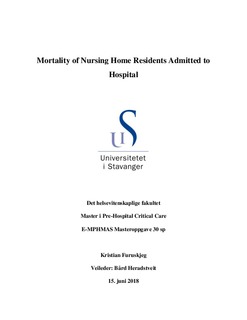Mortality of Nursing Home Residents Admitted to Hospital
Master thesis
Permanent lenke
http://hdl.handle.net/11250/2570514Utgivelsesdato
2018-06Metadata
Vis full innførselSamlinger
- Studentoppgaver (HV) [1373]
Sammendrag
Introduction: Nursing home residents have more than twice the risk of hospitalization compared to community dwellers and have a higher risk for iatrogenic events and hospital death. Reports of adverse events from paramedics in our system as well as existing literature, indicates that these transports may not always be in the patients' interest. To the extreme, transport of moribund patients from nursery homes seems unethical.
Aim: The aim of this study is to examine the 7-days mortality of nursing home residents admitted to hospital by ambulance.
Method: This is an observational study based on nursing home residents admitted to hospital by ambulance in the period 1. January-31. December 2016.
Results: 1772 individual residents where admitted to hospital. The 7-days mortality for residents with problems related to internal medicine was significantly higher (13,9%) than for surgical (10,8%) and orthopaedic (7,1%) conditions (p = <0,05). When isolated into subgroups, 16,2% of the residents with infectious disease died within one week and 21,6% of the patients with respiratory conditions. Patients admitted without being assessed by a physician had a significantly higher mortality than those who had been assessed (7,2% vs. 2,8%, p = < 0,05).
Conclusion: There is a high rate of mortality for residents admitted to hospital with infectious diseases and respiratory problems. In addition, the difference in mortality among those assessed by a physician compared to those who were not assessed indicates that the general practitioner on call plays a vital role in providing access to the correct level of care.
Beskrivelse
Master's thesis in Pre-hospital Critical Care

